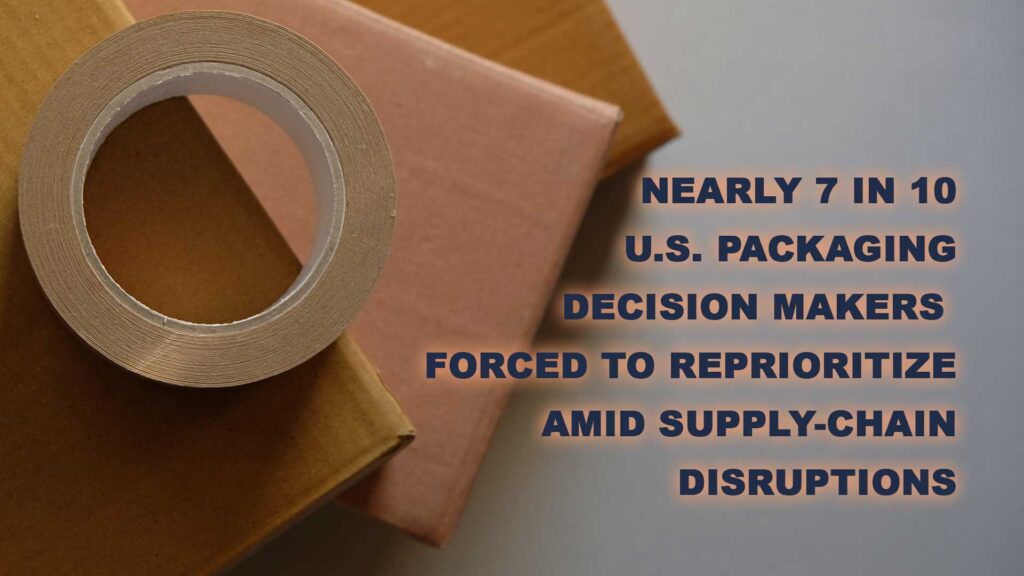A recently released study released by R.R. Donnelley & Sons (Chicago, Illinois) found that the market’s most pressing challenges have forced packaging decision makers to shift priorities and rethink operations, with 90% changing how their packaging is now sourced. The Unpackaging Reality Report explored how converging disruptive issues like supply-chain volatility, inflation, labour shortages and increasing sustainability pressures have impacted the industry.
Surveying 300 packaging decision makers in the U.S. across a variety of industry sectors, the survey was conducted by FINN Partners in the Spring of 2022. RRD’s study found that material price hikes and supply shortages presented the biggest hurdles for the industry over the past year, with over half of respondents reporting that they have been strongly impacted. These challenges, among others, forced organizations to reprioritize packaging materials (68%), budget (52%), packaging design and aesthetics (49%) and sustainability goals (45%). Despite the many challenges brought on by the pandemic and downstream issues, the report found that overall, the packaging industry proved resilient and continues to pursue a more sustainable and innovative future.
“There’s no disputing that rising costs, supply-chain snares, and talent pinches have posed major challenges to the packaging industry, but that doesn’t mean this reality is all doom and gloom,” said Lisa Pruett, President of Packaging, Labels and Forms and Retail Solutions at RRD. “These challenges actually transformed the industry into a more innovative, agile and environmentally-conscious sector. Organizations responded with diverse strategies as there’s not a one-size-fits-all approach to tempering disruptions.” As a leading global provider of marketing, packaging, print, and supply-chain solutions, RRD conducted the comprehensive survey to offer insights into the complex landscape of both immense opportunity and challenges for decision makers. The study’s 3 key findings underscore the packaging industry’s willingness to evolve operations in the face of challenges without losing sight of sustainability goals. They include:
1. Supply-chain challenges lead to innovation. To navigate the market challenges, organizations have been willing to explore a wide range of solutions to their supply-chain issues. Specifically, 62% diversified suppliers, 42% outsourced manufacturing and fulfillment, 39% consolidated suppliers, 30% substituted specs, and 26% re-shored their manufacturing to the U.S. There is broad willingness to pivot to different packaging materials in light of supply-chain sourcing challenges, with over one-third (36%) saying they were extremely willing to use alternative materials. As for guidance and information, 78% of respondents looked to suppliers, vendors or direct manufacturers.
2. E-commerce ignites packaging demand. Packaging needs have skyrocketed in recent years, in part due to the acceleration of online shopping amid the pandemic, and this has created both strain and opportunity for the packaging industry. The majority of respondents (57%) experienced an increase in e-commerce orders in the past 1-2 years and, for nearly all of them (92%), this resulted in an increase in packaging needs. Packaging professionals responded to the growth in e-commerce orders by increasing inventory (55%), expanding warehousing (53%), changing materials (52%), and increasing staff (51%).
3. Strides in sustainability despite cost. Findings contradicted the sentiment that sustainability initiatives fell to the back burner as companies grappled with other pressing priorities, with almost all respondents (94%) agreeing that sustainability is a key consideration in packaging and label decisions. Furthermore, 75% of packaging professionals shifted to more sustainable packaging than what they used previously. When considering sustainability, budget was the top influencing factor – more so than external regulations or consumer preferences – suggesting that cost-effective, eco-friendly materials are still in high demand. Of note, the majority of packaging decision makers (55%) believe that recent supply-chain disruptions moved their companies closer to their carbon-emissions goals, suggesting sustainability initiatives may also prove to be more versatile and resilient. To read the full report, please visit the R.R. Donnelley website.
